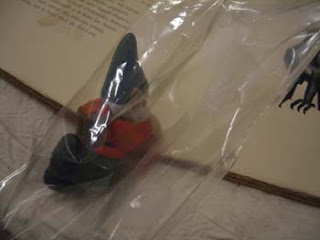 |
| SJ Finn in dappled shade that's me on her knee |
But what we did manage to do was catch up with SJ Finn before the gig. How does she feel about on a panel titled Melbourne's new wave when she's been writing beautifully for years? She's got a nice laugh, she has, and she told me she's got no problem with it... she's read the books by the other panelists of course and she reckons it's all fine writing, so she's in good company.
 We found a dappled spot to sit in and spent some time wagging our chins before the session, on Miriam's lunch break. Nothing like a lunch break to get Miriam's chin wagging.
We found a dappled spot to sit in and spent some time wagging our chins before the session, on Miriam's lunch break. Nothing like a lunch break to get Miriam's chin wagging.SJ Finn's got a really nice energy about her - which you would have noticed probly if you went to the panel this afternoon! We started off talking about her book, about the story itself and about one of its major themes, of the way big decisions in your life end up with a double alteration - an alteration in the way you look at things, in the way you live... and the other alteration is in the world's response to what we do. Sometimes we have to make a decision that will put us through enormous changes - life changes. When Monty from This Too Shall Pass makes the changes she has to make, to be true to herself, the response from 'the world', from those around her is somehow more about the world than it is about Monty. Not all the responses are positive. Sometimes a negative response is the price you pay. We talked about the 'mainstream' and Miriam wondered if there is such a thing. Perhaps a construct, said Finn... a backdrop against which real life is shown in stark relief. So again, like in our short chat to Mandy Sayer last night, we encounter this idea that writing can bring to life the paradox of living a unique life, by setting it against a mainstream; by speaking of the extra-ordinariness of a normal life in an ordinary tone of voice.
And on her own journey, of getting this book written, edited, published, reviewed? Finn says it's been a learning curve. She's staying grounded. There's always something else to look to. She says, you read the reviews and even though ten out of 11 are great, the niggly little comment in number 11 will be the one you focus on. She reckons the thing to do is be tenacious. Hang in there. Just keep working, writing, reading. We think she might be onto something.























